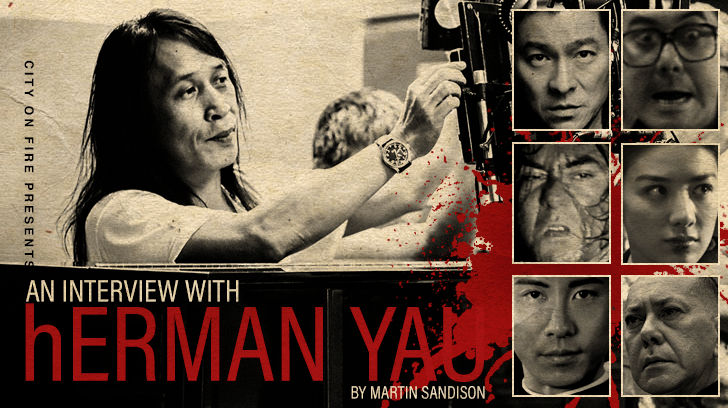
With dozens of credits as a cinematographer and director, Herman Yau is one of the most prolific filmmakers ever to have worked in Hong Kong cinema. His most notorious films have come in the horror genre, especially the extreme classics Bunman: The Untold Story and Ebola Syndrome. A return to this shocking cinema comes in the guise of The Sleep Curse, and a reunion with the legendary Anthony Wong. We had the chance to sit down with him, and pick the brain of a director who has come up with some of the most shocking images ever on screen.
The following interview with Herman (and his collaborator, Erica Li) was conducted at last year’s Udine Far East Film Festival by myself, Tim Youngs, Fred Ambroisine, Andrew Daley and an unidentified journalist. For presentation purposes, I have streamlined all of our questions so it reads easily in “interview” form. Enjoy!
Q: I’d like to start by introducing my guests today. Next to me is Erica Li. Erica is a novelist, as well as a screenwriter. Her filmography covers a wide range of genres, in recent years she has been most well known for her collaborations with Herman Yau. This year she is a guest for The Sleep Curse and Shockwave. Also present is Herman Yau. Herman’s huge filmography as a filmaker goes back in to the 1980’s. He has directed prolifically across many genres, perhaps best known internationally for horror films. His filmography really covers a broad spectrum of Hong Kong cinema. He’s also been active as a writer, producer and cinematographer. He’s here today with The Sleep Curse and Shockwave.
Perhaps we can start with the film we showed last night, The Sleep Curse. It’s a return to the more shocking, extreme cinema that you have worked in before. Can you discuss how the project came about?
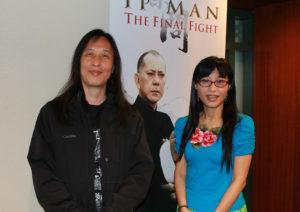
Herman Yau and Erica Li from Asian in New York.
Herman Yau: At first something happened in Hong Kong two years ago, to do with a company run by Chapman To. He wanted to make some Hong Kong movies. The idea for The Sleep Curse came from a ghost story, and Chapman initiated a collaboration between Anthony Wong and I. We intentionally tried to make The Sleep Curse tie in with The Untold Story and Ebola Syndrome, to echo with them.
Later, Erica joined and developed the script and some other elements were integrated in to the story. It became a film with a ghost story element, but also with some magical, black magic elements. We tried to inject some meaning in to it, to do with Karma, and the evil qualities in humans.
Erica Li: When director Yau approached me about the script I felt some pressure, because since The Untold Story there was an expectation of the violent and gory aspects of the film. But according to my observation audiences nowadays are kind of immune to violence. Like I read an article about a 10-year-old boy from the U.S., he has seen 8,000 murders on television already. So it’s difficult for me to do something as extreme as The Untold Story or Ebola.
Also something else I wanted to do was speak for women, especially for those who cannot speak for themselves, victims of wars. I wanted to communicate that there is still some justice to be done. I think that the mental violence of kidnapping girls, this is shocking to the audience.
Q: And of course these days it seems quite difficult to make genre pictures in Hong Kong. Do you find it difficult to make this kind of project?
Herman Yau: I don’t consider it to be a type of comeback. I’ve made some horror films in the past year. The fact that Anthony Wong came back is a big thing. As a filmmaker I would say that I am sometimes quite opportunistic. For instance, some years ago we tried to develop a script about a period in Hong Kong history, concentrating on a young girl. It is concerned with the Japanese occupation in the 1940’s. So with the girl growing up we could show the changes in Hong Kong society, the cultural change, the way of life, how Hong Kong became more and more capitalistic. Most girls at the time were uneducated. A very important thing about the Japanese occupation is the so called ‘comfort women’. These elements were deeply implanted in our brains.
So when we developed the script of The Sleep Curse we started with something that has been proved to a hoax, to do with the Russians in World War 2. And then inspired by that story Erica integrated another element, the important element of the ‘comfort women’, and of course the history of the Japanese occupation of Hong Kong. Then you can see we have the two parallel storylines in The Sleep Curse, one set in 1992 up until 1993.
Erica Li: And there is one point I want to add: When people want to deny history. So I thought it would be a good idea to make a movie to refresh the memory of people. Then there is the song ‘How Do You Sleep at Night’.
Q: We should talk about tonight’s closing film, Shockwave. How did this project come about? Obviously it’s a huge action film.
Herman Yau: I came up with the idea of the occupation of the Cross-Harbour tunnel many years ago. At that time I didn’t have any story, just the idea. Other than protest, the way to go would be a gangster or cop film. To make it easy to realise this project, we set it in the frame of a gangster film. And then in about 2003 I wrote the script, and set it around the Armed Force Unit in the Hong Kong police. And then I met some experts, and learned about this force, whose numbers are less than 20. With those two experts, one who is an Explosives Expert, one is a Bomb Disposal Expert, we discussed the occupation of the Cross-Harbour tunnel. With this idea I developed a script with Erica, about 4 or 5 years ago.
We finished a draft that was up to our standard that can appeal to the audience, and secured the investors and cast. The first cast member that came to our minds was Andy Lau. We had worked before many years ago, starting in the 1980’s. We had a friendship even though we didn’t see each other frequently. We approached him and had a meeting for 2 hours and he said yes to the project. We had to negotiate a lot because Andy has his own company and is a big star. And also because of the censorship of the script by Mainland China, we had to wait. In that time I made 5 or 6 films! (laughter, clapping) Last year the project began to be filmed.
Erica Li: For Shockwave the pregnancy was about 3 or 4 years. The idea of bombing the Cross-Harbour I found very exciting! And then when I finished the script I found that I had the potential to be a terrorist! (laughter) For me the most challenging part is how to put all the action in to a sensible story. Some action movies have no action at all. I wanted to make all the characters more rounded. It tried very hard to put some romance in the story.
Q: What was the significance of the Cross-Harbour tunnel?
Herman Yau: For the Hong Kong people of my age and generation, this is a very important landmark. This landmark also tells a story of Hong Kong history of the past decades. When I was a child the opening of the Cross-Harbour tunnel made a big mark on me. During the 1970’s Hong Kong society went through a huge change, mainly because of the establishment of the Independent Commission Against Corruption. It really changed the society a lot. The Hong Kong Police Force is supposed to protect against physical violence. Before 1972, they were so corrupt. After the ICAC was established, when compared to the 1950’s or 60’s, when we tried to talk about the value of Hong Kong it flourished in the 1970’s and 80’s. In terms of social health, and also for the Economic conditions, and the life of Hong Kong people, all these factors the Cross-Harbour tunnel symbolises. I tried to make Shockwave a very exciting film, a very Hong Kong style.
Erica Li: I tried to remind the audience about altruism. To sacrifice yourself for other people.
Q: In Hong Kong cinema there are a new generation of interesting Hong Kong directors, what do you think about the new generation of Hong Kong actors?
Erica Li: Eric Tsang is looking to direct! (Laughter)
Q: I was wondering, is it possible for Hong Kong films to have more female actors? For them to have a more active role in genres like horror?
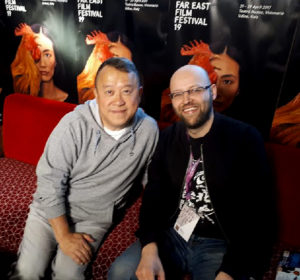
Eric Tsang and Martin Sandison get cozy. Read our interview with Eric here.
Herman Yau: I have made some horror films with female protagonists, but unfortunately those films got bad box office, so they were ignored by the audience. To go back to the point about newcomers, I recall an episode of Hong Kong cinema during the 1970’s up to the early 1980’s. During this time Eric Tsang became a movie star. And we can all remember the cinema city bosses like Karl Maka. He told me that at that time since the industry has no female stars it was difficult. They just wanted the female actors to play roles in the films they were going to make. So it’s difficult for newcomers. Perhaps the Hong Kong film industry now is not big enough.
Q: I want to know something about The Sleep Curse. The movie hasn’t been released in Hong Kong yet. What is the plan for that? Also will the people in Hong Kong watch a different version, as we watched the uncut version here.
Herman Yau: The Sleep Curse will be released in Hong Kong on the 18th of May. I think that most of you know that in Hong Kong the film censorship system is different, especially for a Cat 3 movie. Even though the film is Cat 3, it will be cut by the censors. The version released in Hong Kong will be cut. The one we saw last night was the completely uncut version. Less than ten seconds has been cut. So compared with The Untold Story, about four minutes of that movie was cut. And for Ebola Syndrome, 4 minutes were cut too. So the explicit images etc. in The Sleep Curse was cut less than The Untold Story and Ebola Syndrome.
Q: A few weeks ago I had an interview with Anthony Wong, and he was saying that when he made the movie The Untold Story he was surprised that the movie recieved awards. And on the contrary he was surprised that your other movies together like Ip Man: The Final Fight didn’t get success. So how did you convince Anthony Wong to go back to Category 3 movies?
Herman Yau: So Anthony is a friend of mine, and the people surrounding you always wear mysterious masks that you can never understand. And also if we consider film as a form of art, or a medium, I think we should not narrow down our eyesight. And just like Ebola Syndrome it was released in 1996, the box office was really bad. After 20 years it is regarded as a remarkable work of mine and Anthony’s. So I think we should not care about these things, and have good thoughts about what we have done. Sometimes I make a joke with Anthony Wong, and I use an old saying that in 50 or 100 years what films will people watch? I think it’s more important, and these films will have a longer life than us. We can earn our living, and do what we like to do.
Q: A question about Shockwave. Did you collaborate with real Bomb Disposal Experts for the film?
Herman Yau: 2000 and something I wrote a script for a TV drama with the support of the Hong Kong Police Force. At that time I had a chance to meet Bomb Disposal Officers, and discuss their unit with them, which is very small, less than 20 people. I think it’s the smallest unit in the Hong Kong Police Force. They are so professional. The job is so special to Hong Kong citizens. During the research process I learned quite a lot about explosives and the job the Bomb Disposal Officers do. After writing that script the idea of making a movie to portray the job they do was like a seed in my mind, and I always wanted to make it in to a movie.
Q: So, the movie Bunman: The Untold Story is very famous in the West, and all around the world. Could you talk about shooting the film and the legacy of the film?
Herman Yau: Actually the response, how the film was received was out of my expectation. At the time I treasured the chance to make the film. When Danny Lee approached me and asked me if I would like to make the film, after 3 seconds I said yes, even though I didn’t know my salary! So I worked on the project. I think you know it is based on the real life story, and in this way I think The Untold Story is the portrait of a murderer.
Q: I wanted to ask you about working with Andy Lau and Anthony Wong in you recent projects, could you discuss more about working with them? It has been a while since you worked with Anthony Wong. Could you talk about working with these big Hong Kong stars?
Herman Yau: Working with Anthony Wong is quite easy, although I heard some Hong Kong film makers say that he is difficult. I think because we developed our friendship more than 30 years ago, when we were nobodies in the film industry. I think that kind of mutual respect, mutual understanding, is quite different from my relationship with other actors, even superstars in the film industry. When I first entered in to the industry, Andy Lau was known, because he had just left the TV station for 3 years. And so at that time he was already a star. Since he was so new to the film industry, he realised that the TV crew and the film crew are entirely different people. When I first met him I was a cinematographer, and our working relationship began then. In the 1980’s I worked on a few films with Andy Lau as the the star. So we knew each other from those days. From the 1990’s until now we had some chances to work together. But before Shockwave we had not been working together for 13 years.
Q: In the film The Sleep Curse did you intentionally make a link between the horrors of the film and the horrors of the Japanese army during the 2nd World War?
Herman Yau: The Sleep Curse started as a ghost story. I always say “ what is a ghost story?” A story about ghosts. I don’t care too much about the genre of the film. I understand very well that every film I make can be categorised. So when we have a project and there is an element I have to put in to the film, what are the other contents? And then we try to get the materials together, and what elements we will inject in to the film to enhance the content.
Before The Sleep Curse I worked with Erica Li on a project about the past history of Hong Kong. Part of that story is about the Japanese occupation of Hong Kong during the 2nd World War. And the “comfort woman” was an issue. Unfortunately we could not realise that project. We tried to take some elements of this script. Then we saw a Russian sleep experiment on youtube in World War 2, which was later proved to be a hoax. It was just created by some very inventive people on the internet. So we took these two elements in to a film. So you can see the narrative structure of The Sleep Curse; one part is in the 90’s and the other plotline is in 1943.
Q: In the horror genre which movies are you influenced by? And do you like the horror movies from Shaw Brothers made in the early 1980’s?
Herman Yau: I enjoy watching movies from no less than ten years ago. When you mentioned Shaw Brothers movies, of course I have watched them. But in fact I don’t have a very good memory of all those films. I can’t remember anything about some of them. If you asked me if I was influenced by all those Shaws films, in terms of horror, I would say no. Unless there is some Freudian theory about the subconscious. Other than that, I would say no. For some Wuxia genre of films, I remember quite a lot of them. Not the full stories, but some moments. Like Chang Cheh’s movies, I remember quite a number of moments.
Q: I asked Eric Tsang yesterday about the future of Hong Kong cinema. We’ve seen a lot of Hong Kong/Mainland co-productions, such as Jackie Chan and Eric’s Kung Fu Yoga, which is a Mainaland/Indian co-production. Where do you see the future going for Hong Kong and yourselves as Fimmakers?
Herman Yau: It’s nothing new. When you go back to the 1950’s, that kind of production existed. We are concentrating on Hong Kong Chinese cinema is the centre of our discussion. During the 1950’s and 60’s Hong Kong production companies like Shaw Brothers and Cathay, which no longer exist, they had joint productions with Japan, France, the US. So they want to secure the market and distribution. So it’s a kind of cultural exchange. Starting from the 1980’s this kind of globalisation happened, and I think it’s logical for this business. So this kind of working relationship it developed, and is developing again, for Hong Kong cinema.
In the 80’s it went really fast for this cinema, not for Chinese cinema, because it was still a closed door country. Now it has developed in to an open door country. And then the economic reform during the late 70’s, meant that the cinema underwent a process to develop bigger productions. Of course because of the political background of the People’s Republic of China they did not open so quickly. So they opened that kind of joint venture later. This mind of production developed around 1992. Because Hong Kong is so close to China, they took it as kind of experiment, so they chose a place closer to Hong Kong, with a long historical and political linkage. On one hand, it’s still business, on the other it’s kind of example to show the world China has opened its door.
Q: Eric Tsang made a comment that productions in China and Hong Kong are a lot more international focussed. So you could have actors from mainland China, your DP could be from France. Do you see yourselves working on productions outside of Asia?
Herman Yau: It’s also nothing new. When Eric Tsang was a stuntman, we had Japanese cinematographers in Hong Kong. We had cinematographers from South Africa. We are undergoing a big change for Hong Kong cinema, but in terms of those changes it’s nothing new. The change now and then share a number of similarities.
Q: You have worked a lot as a cinematographer as well as a director, you have maybe as many credits for both. Could you talk about working in Hong Kong as a cinematographer and especially the film Seven Swords with the late Lau Kar Leung and Donnie Yen?
Herman Yau: In general if you are talking about the films of Tsui Hark, he will try his best to source all of the resources. With goodwill, he wants to make a great movie. When all of the resources are used by him, the film cannot be finished. He will try and secure more people to help him. So for the later process I worked with Tsui Hark, all the films I joined his crew, was always the most difficult time. They had to finish the film as fast as possible, because the weather in Xinjiang was getting colder and colder.
When I was shooting Seven Swords sometimes it was -20 at night. It’s really horrible. When it was about November, when December came it was impossible to shoot, it was too cold. So Tsui Hark added another unit to make the production go faster. At that time Tsui Hark had good relations with (I don’t want to mention the name) an actor. He wanted me to shoot that part with the actor. But when I went to Xinjiang I found that every scene involving that actor had been shot. So it’s very difficult for me to do it. Not all over again, but maybe it was better that way. So it’s very difficult for me to fill those holes. So I told Tsui Hark that I could not do that, I lacked the ability. So that’s the last time I served as cinematographer on the C unit.
Q: I’d like to ask both of you your thoughts on Sleep Curse being compared to your earlier films like The Untold Story and Ebola Syndrome. What are your opinions about this?
Erica Li: Actually, I just realised that there is some relationship between Sleep Curse and Shockwave. It is the both ends of humanity. Sleep Curse is about a man in avery desperate situation, and he chooses to be selfish. While Shockwave, Andy Lau’s character and the rest of the unit, they choose altruism. This is to sacrifice themselves for the wellness of all. But for the trilogy, the difference between Untold Story…
Herman Yau: I have to say it is not a trilogy, that is not my intention. On the internet I have found some fans who mention Taxi Hunter, that is the trilogy. I admit that The Sleep Curse echoes some elements or moments of Ebola Syndrome and The Untold Story, but I don’t have any intention. Of course I worked with Anthony Wong again on a Cat 3 movie.
Q: You have made a lot of different types of films from Action to comedy to Horror. Which genre do you most like working in?
Herman Yau: I like many genres. I wouldn’t like to make just one genre of films. That would be very boring (laughter)
Q: Erica, writing the script for The Sleep Curse, where did the idea come from?
Erica Li: It was 24 years since Untold Story, and we would like to have another collaboration with Anthony Wong. For me, I studied the past. I knew that people would have expectations because of Untold Story and Ebola Syndrome, that was my first concern. I think the part of history when The Sleep Curse is set is horrific enough to make a film in this genre. And I wanted to speak on behalf of the victims.
Q: The part of Untold Story that everyone remembers is the scene when the kids are killed. Could you talk about the filming of that scene, was it very difficult?
Herman Yau: Not really difficult. The most difficult part was not letting the kids know what we are filming. So we had to lie to them. Anthony Wong was very playful with the kids, offscreen. He always made them laugh! Another difficulty was I would have to try and finish the part of the kids early, before midnight. And they could go and we would continue with shooting, because some of them had to go to school. Maybe two years ago, a friend told me that he knew a girl that played on of the kids, and she was allowed to watch the film. She said it was “interesting!” (laughter) And she really didn’t know what we were filming.
Q: Two years ago I asked you about your PHD and how your work has changed since you became a Doctor. So between the both of you has anything changed at all? It might be wrong to say that people respect you more because you’re still a legendary director in Hong Kong. But getting a PHD is not a small thing either. So how has it affected your work as a director?
Herman Yau: I don’t think there’s much change, talking about how people see me when we are working together. When we are not working together, I think people would say that “Oh there’s a film maker working in Hong Kong that can be considered to be kind of intellectual”. Yes, that’s how they see me, people without a working relationship with me. But when we work together, still, they would try and do what they think is good with their knowledge. They won’t agree with you more because you have a PHD. So, I don’t think there’s an obvious change. There’s some obscure change.
Q: I wanted to ask you about the Ip Man films you made, The Final Fight and Legend Is Born. They were big budget movies. How was it working on them compared with something like the Untold Story?
Herman Yau: Not a very large difference. For instance, in Ip Man: The Final Fight the set itself cost a lot. So the movie looks big budget. Also it involved a lot of fight scenes, that I needed more time. Still less time than other filmmakers. For Untold Story and Ebola Syndrome, I didn’t need much budget. For the Ip Man movies, they are period films so every department cost a lot. When we are talking about how we spend those resources, it doesn’t make a lot of difference.
But in terms of time, these so-called larger budget productions take more to shoot. When I try to tell a story, actually it’s not so difficult. But how to enhance your narrative, it takes time. And how you make the image more fascinating, it takes more time. With three shots you can tell a story. With thirteen shots you can tell a story in more detail.
Thanks again to Martin Sandison, Herman Yau and Erica Li for taking the time to do this interview.

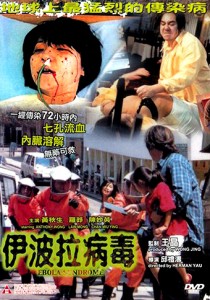
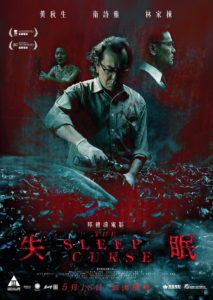
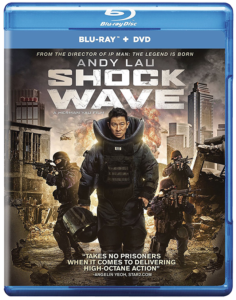
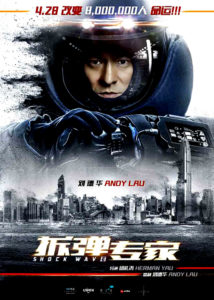
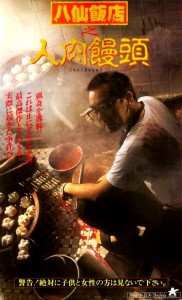
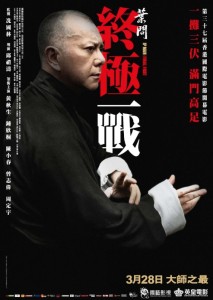
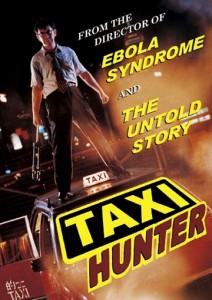
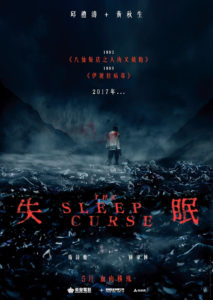
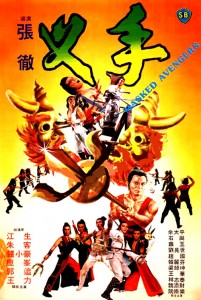
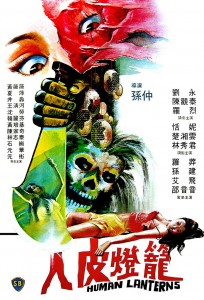
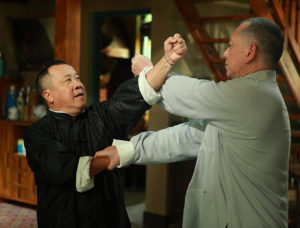
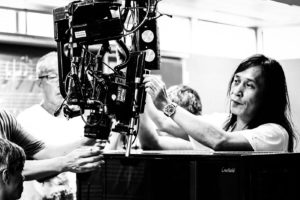
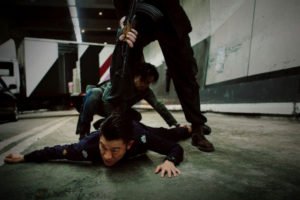
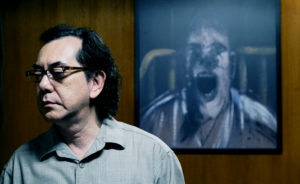
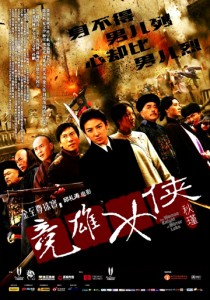
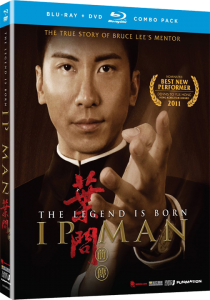


Great Read!! Thank You for posting this!!
Cheers Andrew!